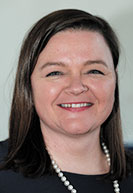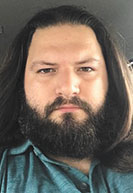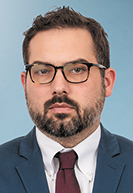Subscriber Benefit
As a subscriber you can listen to articles at work, in the car, or while you work out. Subscribe NowWith Indiana’s primary election coming up on May 7, the polls are in need of workers.
In Marion County, the election board and county clerk are working with a local law firm to recruit attorneys to assist with the big day.
A continuing legal education class on “Indiana Election Law: The Role of Poll Workers” was held at Faegre Drinker law firm in Indianapolis on April 22.

Marion County Clerk Kate Sweeney Bell said the idea to host the free class came from conversations on ways to boost civic involvement and engagement among members of the legal community.
The hope is that some of the attendees will agree to become inspectors at polling sites on Election Day.
Marion County Election Board Director of Elections Patrick Becker worked with Bell on the training.
Becker said there are a lot of complex legal aspects to voting like determining voter eligibility and controlling people outside poll sites who are promoting certain candidates, and lawyers serving as poll site inspectors could easily resolve some of those issues.
“The idea behind the training is it’s basically an inspector training, so a poll worker training, and then kind of really going through a lot of those sort of legal aspects and issues that come up on election day,” Becker said. “So the hope is that these folks will want to go be an inspector for the whole day.”
Counties across the state are trying a myriad of ways to make up for a shortage of poll workers.
Last November, several counties took advantage of the Hoosier Hall Pass Program, which allows 16- and 17-year old students to miss a day of school and staff the polls to experience democracy in action.

The Indiana Secretary of State’s office runs the program and requires students to have at least a 3.0 grade point average on a 4.0 scale, as well as permission from their principal and a parent.
They also must complete a training program.
The students can’t serve as inspectors, who manage polling sites. But they can be clerks, assistant clerks or assistant judges, helping voters check in and answering questions about how to operate voting machines.
Becker said Marion County also is working to develop corporate partnerships with some groups to encourage them to provide volunteers to work the polling sites on Election Day.
He said county officials already do a lot of work with the League of Women Voters to find poll workers.
But he would also like to see partnerships with Indiana Pacers and the Indianapolis Colts.
“Everybody benefits from well-run vote centers, right? Everybody benefits from well-run elections,” Becker said. “I think this is kind of a first step in: ‘how do we kind of broaden this net and bring more people who have an interest in good community civic engagement?’”
Hotline calls
Indiana lawyers also help operate the election inspector hotline on Election Day to help provide poll workers with quick answers to any issues that may arise.

Faegre Drinker associate Brad Boswell said he has been part of the election inspector hotline for several years.
He said some of the calls are about technology issues that have popped up due to changes in voting machines.
Others involve trying to determine whether a person is actually eligible to vote.
“We have to sort of like … stop and work through whatever the anomaly is for this voter to try to make sure they can, they can properly vote if they’re supposed to,” Boswell said. “And that oftentimes requires coordination with the county voter registration office.”
The hotline also gets calls about how to accommodate people who are campaigning outside an election site when it’s raining and need shelter. State law prohibits any campaigning within 50 feet of the polling place but sometimes inventive solutions can be found.
“You get a lot of sweet old ladies that pass out literature and trying to be thoughtful about that, and figuring out what the parameters are and what they can do to help folks,” Boswell said.•
Please enable JavaScript to view this content.

